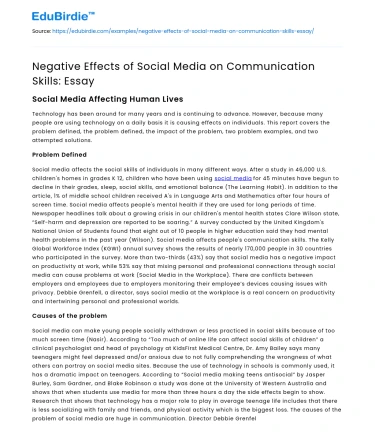Social Media Affecting Human Lives
Technology has been around for many years and is continuing to advance. However, because many people are using technology on a daily basis it is causing effects on individuals. This report covers the problem defined, the problem defined, the impact of the problem, two problem examples, and two attempted solutions.
Problem Defined
Social media affects the social skills of individuals in many different ways. After a study in 46,000 U.S. children's homes in grades K 12, children who have been using social media for 45 minutes have begun to decline in their grades, sleep, social skills, and emotional balance (The Learning Habit). In addition to the article, 1% of middle school children received A's in Language Arts and Mathematics after four hours of screen time.
Save your time!
We can take care of your essay
- Proper editing and formatting
- Free revision, title page, and bibliography
- Flexible prices and money-back guarantee
Social media affects people's mental health if they are used for long periods of time. Newspaper headlines talk about a growing crisis in our children's mental health states Clare Wilson state, “Self-harm and depression are reported to be soaring.” A survey conducted by the United Kingdom's National Union of Students found that eight out of 10 people in higher education said they had mental health problems in the past year (Wilson).
Social media affects people's communication skills. The Kelly Global Workforce Index (KGWI) annual survey shows the results of nearly 170,000 people in 30 countries who participated in the survey. More than two-thirds (43%) say that social media has a negative impact on productivity at work, while 53% say that mixing personal and professional connections through social media can cause problems at work (Social Media in the Workplace). There are conflicts between employers and employees due to employers monitoring their employee’s devices causing issues with privacy. Debbie Grenfell, a director, says social media at the workplace is a real concern on productivity and intertwining personal and professional worlds.
Causes of the problem
Social media can make young people socially withdrawn or less practiced in social skills because of too much screen time (Nasir). According to “Too much of online life can affect social skills of children” a clinical psychologist and head of psychology at KidsFirst Medical Centre, Dr. Amy Bailey says many teenagers might feel depressed and/or anxious due to not fully comprehending the wrongness of what others can portray on social media sites.
Because the use of technology in schools is commonly used, it has a dramatic impact on teenagers. According to “Social media making teens antisocial” by Jasper Burley, Sam Gardner, and Blake Robinson a study was done at the University of Western Australia and shows that when students use media for more than three hours a day the side effects begin to show. Research that shows that technology has a major role to play in average teenage life includes that there is less socializing with family and friends, and physical activity which is the biggest loss.
The causes of the problem of social media are huge in communication. Director Debbie Grenfell states, “For many employees, social media is becoming a regular part of their lives.” A study was conducted in which 55% of workers indicated that employers did not have the right to view their employees ' social networking sites. While 53% said employers did not have the right to view the social networking pages of prospective employees. There are many complications with privacy and being able to communicate with one another. Grenfell states, “Employees are aware of the risks of social media, both in terms of productivity and the risk of mixing business and personal lives. So if an employer is upfront and honest about those concerns, employees will be far more understanding. The key is an open dialogue that acknowledges the sensitivity employees feel about their privacy, and the balance between their work and personal lives.”






 Stuck on your essay?
Stuck on your essay?

